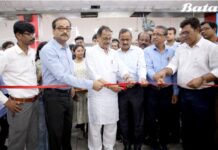
Speaking on the occasion, the Minister of State (Independent Charge) for Skill Development and Entrepreneurship Shri Rajiv Pratap Rudy said that the cabinet has recently approved the National Policy for Skill Development and Entrepreneurship and this will help the Ministry to bring uniformity across the skill initiatives it plans with all the Central Ministries. He said, with today’s MoUs, the Ministry is now focusing on the need for skilled manpower in the Steel and Mining industry with the help of Union Minister for Steel and Mines, Shri Narendra Singh Tomar. He said, both the Ministries will together ensure that we have standardized vocational training and infrastructure for the industry so that it becomes a self-sufficient and progressive industry and also create more opportunities globally.
Shri Rudy said that the Ministry is also going to undertake ‘Recognition of Prior Learning (RPL)’ for around 5 lakh working in the mines and coal sector. The Skill Council for Mining Sector (SCMS) plans to upskill and train approximately 4.50 lakhs people for mining industries including 50,000 new inductees to make them employable within a period of ten years.
Giving a direction to the industry’s growth, the Minister for Steel and Mines Shri Narendra Singh Tomar said, a three-layer framework for skill development should be adopted to meet the country’s requirement. Firstly, we need to assess the need based skill requirements in the sectors on a short-term and long-term basis. Then we should think of requirements of upstream and downstream industry and thirdly the requirements of allied industry. He said, instead of working separately on small scale, we should work cohesively on a bigger scale. This planning is of utmost importance to meet the demand and execute skill development in a strategic manner.
He thanked Shri Rajiv Pratap Rudy for extending his Ministry’s support to Steel and Mines in ensuring standardized training for the manpower in the sector. The Minister said, he will also encourage the PSUs under his Ministries to support the agreements made today.
According to a report launched in 2014, adequate supply of skilled labour could pose a big challenge for the steel industry alone which will need 2.85 lakh more such workers to treble the annual capacity to 300 million tonnes within 10-12 years.
As per estimates by the domestic steel industry, as India increases its capacity from around 100 MT now, an additional 2.85 lakh workforce would be required, considering the productivity at 700 tonnes of crude steel produced per person, per year.
The Indian steel industry employs around two lakh people at present, including around 97,000 by SAIL itself. Factoring that 15 per cent of total manpower in a steel plant are engineers, the state-run steel firm estimates that there would be an additional requirement of 43,000 engineers in the industry by 2024-25.
As part of the agreement, MSDE will set standards and quality assurance process to facilitate implementation of the projects agreed under the MoU. It will also ensure identification of relevant Quality Packs – National Occupational Standards, which will be aligned with National Skills Qualification Framework levels for various job roles in selected sectors as per the demand for the three industries. This will ensure standardized training delivery through ITIs/ATIs/RVTIs and select NSDC training partners for the industry.
MSDE will also ensure assessment and certification conducted by NCVT or relevant NSDC approved Sector Skill Councils and will provide a pathway to existing and retired employees of PSUs to work as Assessor or Trainer, through relevant courses by ATIs/RVTIs and NSDC Training partners.
The ministries will help facilitate the identification and optimal utilization of existing training infrastructure, maximising apprenticeship training in PSUs in coordination with DGT, as permitted under the amended Apprentices Act.
According to the agreement, the two ministries will also encourage PSUs and related contractors to hire workforce certified on job roles aligned to NSQF, put in place a policy for incentivizing skill training and certification under NSQF in recruitment process, and certification of RPL (Recognition of Prior Learning) of skilled/semi-skilled people. PSUs will also be encouraged to utilize their CSR funds for skilling purposes and to set up Centre(s) of Excellence in collaboration with DGT or NSDC for skill training in the core sector and allied sectors
These MoUs are big steps by the government to give shape to the Prime Minister’s vision of a “Skilled India” which is to be launched on July 15th by Shri Narendra Modi.
































